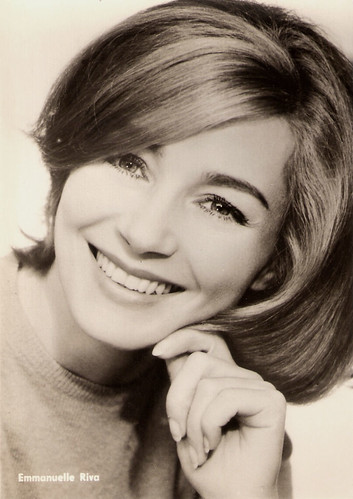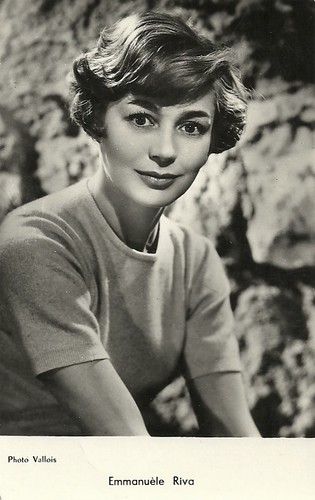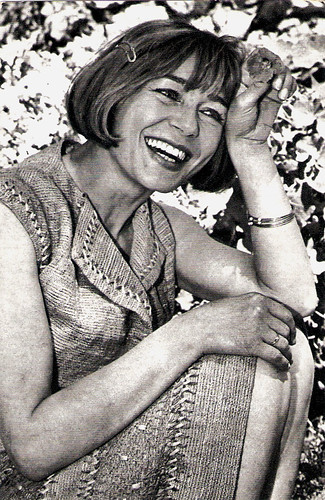On Friday 27 January 2017, French actress Emmanuelle Riva passed away at the age of 89. She became well-known for her roles in the classic Nouveau Vague films Hiroshima mon amour (1959) and Léon Morin, prêtre (1961). In her 80s, Emmanuelle Riva became an icon for world cinema all over again with Michael Haneke's Amour (2012). Riva received both the Bafta and the César award for her role as the retired music teacher Anne in Amour. She was also nominated for an Oscar for her touching performance.

East-German postcard by VEB Progress Filvertrieb, Berlin, no. 1269, 1969. Retail price: 0,20 M. Photo: Unifrance Film. Publicity still for Berufsrisiko/Les risques du métier (André Cayatte, 1967).
Emmanuelle Riva was born Paulette Germaine Riva in Cheniménil in eastern France in 1927. She was the only child of Jeanne Riva née Nourdin and Alfredo Riva, an Italian born sign painter.
From the age of 6, Emmanuelle dreamed about becoming an actress, and appeared in various school plays and amateur dramatics groups. For a provincial girl, from a modest family with no connection to the world of theatre or cinema, the theatre seemed an impossible ambition. She worked as a seamstress.
At the age of 26, Riva moved to Paris where she studied at the Dramatic Arts Centre of Rue Blanche. She made her stage debut in George Bernard Shaw’s Arms and the Man. Further classical roles followed in Mrs Warren’s Profession (Shaw), L’Espoir (Henri Bernstein), Le Dialogue des Carmélites (Georges Bernanos), and Britannicus (Jean Racine).
She made her screen debut on television playing the Queen of England in the historical anthology series Enigmas de L’Histoire/Enigmas of History (1956-1957). The following year she made her first film appearance with an uncredited role in Les grandes familles/The Possessors (Denys de la Patellière, 1958) starring Jean Gabin.
The following year she acted in the Dominique Rolin play L'Epouvantail (The Scarecrow) at the Théatre de L'Oeuvre in Paris. She was visited in her dressing room by young documentary film maker who had directed only a few shorts and documentaries, Alain Resnais.
Resnais offered her the female lead, Elle, in his first feature film Hiroshima mon amour/Hiroshima My Love (Alain Resnais, 1959) written by Marguerite Duras. Riva played an unnamed French woman - Elle translates as She - talking to her young Japanese lover about the bombing of Hiroshima, about memory and forgetfulness. Riva’s powerful, haunting performance helped the film to become a huge art-house hit. For her role she was nominated for a Bafta Award in 1960. Hiroshima mon amour was also a catalyst for the Nouvelle Vague, the French New Wave, innovatively using miniature flashbacks to create a uniquely nonlinear storyline.

French postcard by Editions P.I., Paris, no. 1088. Presented by Les Carbones Korès 'Carboplane'. Photo: Studio Vallois.
In the following years, Emmanuelle Riva appeared in critically acclaimed roles in films like the Oscar nominated Holocaust drama Kapò (Gillo Pontecorvo, 1959), and the comedy Adua e le compagne/Adua and her Friends (Antonio Pietrangeli, 1960) as Simone Signoret's feisty friend.
In Léon Morin, prêtre/Leon Morin, Priest (Jean-Pierre Melville, 1961) she played an atheist widow in a sexually charged friendship with a priest played by Jean-Paul Belmondo.
James Travers in his review at Films de France: “What makes this such a compelling film are the extraordinary performances from its two lead actors, Jean-Paul Belmondo and Emmanuelle Riva. (...) Riva’s portrayal of a woman tormented by unrequited love is equally arresting and gives the film its harrowing realism and poignancy. Both performances are complemented by the film’s austere realist design, the bleakness of the wartime setting underlined by the work of Melville’s trusted cinematographer Henri Decaë. Léon Morin, prêtre is a powerfully moving study in desire and moral conflict, arguably the darkest and most unsettling of all Jean-Pierre Melville’s films.”
Riva then won the Volpi Cup for best actress at the Venice Film Festival 1962 for her role as an unhappily married provincial wife who poisons her husband in Thérèse Desqueyroux (Georges Franju, 1962).
She worked with director Georges Franju again on the Jean Cocteau adaptation Thomas l'imposteur/Thomas the Imposter (Georges Franju, 1965). These were all European, mostly French films. Riva spoke French and some Italian but did not speak English and never performed in English.

Romanian postcard by Casa Filmului Acin, no. 177.
Emmanuelle Riva turned down many ‘commercial’ roles and producers stopped calling. Through the years, she enjoyed an extensive theatre career in Paris. In 2001, her last stage appearance was in a production of Medea at Odéon-Théâtre de l'Europe.
She appeared occasionally on French television programs, published poems and was also a skilled photographer. When she was in Japan to shoot Hiroshima, mon amour (1959), she bought a Ricohflex and began to take photos of people. In 2008, these photographs were exhibited at the Nikon Salon and were issued in the book Tu n'as rien vu à Hiroshima (You have seen nothing in Hiroshima).
She continued to appear in respectable films like Les risques du métier/Risky Business (André Cayatte, 1967) as the co-star of Jacques Brel, Gli occhi, la bocca/The Eyes, the Mouth (Marco Bellocchio, 1982) as a deeply religious mother whose son (Lou Castel) attempts to shield her from the truth about the death of his twin brother, Liberté, la nuit/Freedom, the night (Philippe Garrel, 1983) as the estranged wife of a revolutionary (Maurice Garrel), and Trois Couleurs: Bleu/Three Colours: Blue (Krzysztof Kieślowski, 1983) as the mother of Juliette Binoche.
In 1999 she appeared alongside Micheline Presle in Vénus beauté (institut)/Venus Beauty Institute (Tonie Marshall, 1999), and in 2011 in Le Skylab, starring and directed by Julie Delpy.
The following year she had an extraordinary career renaissance with her role as retired piano teacher Anne Laurent in Amour (2012, Michael Haneke). Anne lives in a chic Paris apartment with her husband, Georges (Jean-Louis Trintignant), until a series of strokes spark dementia, physical disability and a slow dismantling of her body and mind.
The film got rave reviews and won the Palme d’Or at the Cannes Film Festival. Riva won for her role both the Bafta Award and the César Award for best actress. She was also nominated for an Academy Award for best actress - the oldest actress ever to be so. The 85th Academy Awards were held on her 86th birthday, but she lost out to Jennifer Lawrence.
Emmanuelle Riva died from cancer on 27 January 2017 in Paris at the age of 89. She was never married and did not have children.
Trailer Hiroshima mon amour/Hiroshima My Love (1959). Source: Criterion Collection (YouTube).
Trailer Léon Morin, prêtre/Leon Morin, Priest (1961). Source: neondreams 25 (YouTube).
Trailer Amour (2012). Source: @HOLLYWOOD (YouTube).
Sources: James Travers (Films de France), Kim Willsher (The Observer), Riccardo Simonazzi (IMDb), New Wave Film.com, Wikipedia, and IMDb.

East-German postcard by VEB Progress Filvertrieb, Berlin, no. 1269, 1969. Retail price: 0,20 M. Photo: Unifrance Film. Publicity still for Berufsrisiko/Les risques du métier (André Cayatte, 1967).
Elle
Emmanuelle Riva was born Paulette Germaine Riva in Cheniménil in eastern France in 1927. She was the only child of Jeanne Riva née Nourdin and Alfredo Riva, an Italian born sign painter.
From the age of 6, Emmanuelle dreamed about becoming an actress, and appeared in various school plays and amateur dramatics groups. For a provincial girl, from a modest family with no connection to the world of theatre or cinema, the theatre seemed an impossible ambition. She worked as a seamstress.
At the age of 26, Riva moved to Paris where she studied at the Dramatic Arts Centre of Rue Blanche. She made her stage debut in George Bernard Shaw’s Arms and the Man. Further classical roles followed in Mrs Warren’s Profession (Shaw), L’Espoir (Henri Bernstein), Le Dialogue des Carmélites (Georges Bernanos), and Britannicus (Jean Racine).
She made her screen debut on television playing the Queen of England in the historical anthology series Enigmas de L’Histoire/Enigmas of History (1956-1957). The following year she made her first film appearance with an uncredited role in Les grandes familles/The Possessors (Denys de la Patellière, 1958) starring Jean Gabin.
The following year she acted in the Dominique Rolin play L'Epouvantail (The Scarecrow) at the Théatre de L'Oeuvre in Paris. She was visited in her dressing room by young documentary film maker who had directed only a few shorts and documentaries, Alain Resnais.
Resnais offered her the female lead, Elle, in his first feature film Hiroshima mon amour/Hiroshima My Love (Alain Resnais, 1959) written by Marguerite Duras. Riva played an unnamed French woman - Elle translates as She - talking to her young Japanese lover about the bombing of Hiroshima, about memory and forgetfulness. Riva’s powerful, haunting performance helped the film to become a huge art-house hit. For her role she was nominated for a Bafta Award in 1960. Hiroshima mon amour was also a catalyst for the Nouvelle Vague, the French New Wave, innovatively using miniature flashbacks to create a uniquely nonlinear storyline.

French postcard by Editions P.I., Paris, no. 1088. Presented by Les Carbones Korès 'Carboplane'. Photo: Studio Vallois.
Tormented by unrequited love
In the following years, Emmanuelle Riva appeared in critically acclaimed roles in films like the Oscar nominated Holocaust drama Kapò (Gillo Pontecorvo, 1959), and the comedy Adua e le compagne/Adua and her Friends (Antonio Pietrangeli, 1960) as Simone Signoret's feisty friend.
In Léon Morin, prêtre/Leon Morin, Priest (Jean-Pierre Melville, 1961) she played an atheist widow in a sexually charged friendship with a priest played by Jean-Paul Belmondo.
James Travers in his review at Films de France: “What makes this such a compelling film are the extraordinary performances from its two lead actors, Jean-Paul Belmondo and Emmanuelle Riva. (...) Riva’s portrayal of a woman tormented by unrequited love is equally arresting and gives the film its harrowing realism and poignancy. Both performances are complemented by the film’s austere realist design, the bleakness of the wartime setting underlined by the work of Melville’s trusted cinematographer Henri Decaë. Léon Morin, prêtre is a powerfully moving study in desire and moral conflict, arguably the darkest and most unsettling of all Jean-Pierre Melville’s films.”
Riva then won the Volpi Cup for best actress at the Venice Film Festival 1962 for her role as an unhappily married provincial wife who poisons her husband in Thérèse Desqueyroux (Georges Franju, 1962).
She worked with director Georges Franju again on the Jean Cocteau adaptation Thomas l'imposteur/Thomas the Imposter (Georges Franju, 1965). These were all European, mostly French films. Riva spoke French and some Italian but did not speak English and never performed in English.

Romanian postcard by Casa Filmului Acin, no. 177.
An extraordinary career renaissance
Emmanuelle Riva turned down many ‘commercial’ roles and producers stopped calling. Through the years, she enjoyed an extensive theatre career in Paris. In 2001, her last stage appearance was in a production of Medea at Odéon-Théâtre de l'Europe.
She appeared occasionally on French television programs, published poems and was also a skilled photographer. When she was in Japan to shoot Hiroshima, mon amour (1959), she bought a Ricohflex and began to take photos of people. In 2008, these photographs were exhibited at the Nikon Salon and were issued in the book Tu n'as rien vu à Hiroshima (You have seen nothing in Hiroshima).
She continued to appear in respectable films like Les risques du métier/Risky Business (André Cayatte, 1967) as the co-star of Jacques Brel, Gli occhi, la bocca/The Eyes, the Mouth (Marco Bellocchio, 1982) as a deeply religious mother whose son (Lou Castel) attempts to shield her from the truth about the death of his twin brother, Liberté, la nuit/Freedom, the night (Philippe Garrel, 1983) as the estranged wife of a revolutionary (Maurice Garrel), and Trois Couleurs: Bleu/Three Colours: Blue (Krzysztof Kieślowski, 1983) as the mother of Juliette Binoche.
In 1999 she appeared alongside Micheline Presle in Vénus beauté (institut)/Venus Beauty Institute (Tonie Marshall, 1999), and in 2011 in Le Skylab, starring and directed by Julie Delpy.
The following year she had an extraordinary career renaissance with her role as retired piano teacher Anne Laurent in Amour (2012, Michael Haneke). Anne lives in a chic Paris apartment with her husband, Georges (Jean-Louis Trintignant), until a series of strokes spark dementia, physical disability and a slow dismantling of her body and mind.
The film got rave reviews and won the Palme d’Or at the Cannes Film Festival. Riva won for her role both the Bafta Award and the César Award for best actress. She was also nominated for an Academy Award for best actress - the oldest actress ever to be so. The 85th Academy Awards were held on her 86th birthday, but she lost out to Jennifer Lawrence.
Emmanuelle Riva died from cancer on 27 January 2017 in Paris at the age of 89. She was never married and did not have children.
Trailer Hiroshima mon amour/Hiroshima My Love (1959). Source: Criterion Collection (YouTube).
Trailer Léon Morin, prêtre/Leon Morin, Priest (1961). Source: neondreams 25 (YouTube).
Trailer Amour (2012). Source: @HOLLYWOOD (YouTube).
Sources: James Travers (Films de France), Kim Willsher (The Observer), Riccardo Simonazzi (IMDb), New Wave Film.com, Wikipedia, and IMDb.
No comments:
Post a Comment